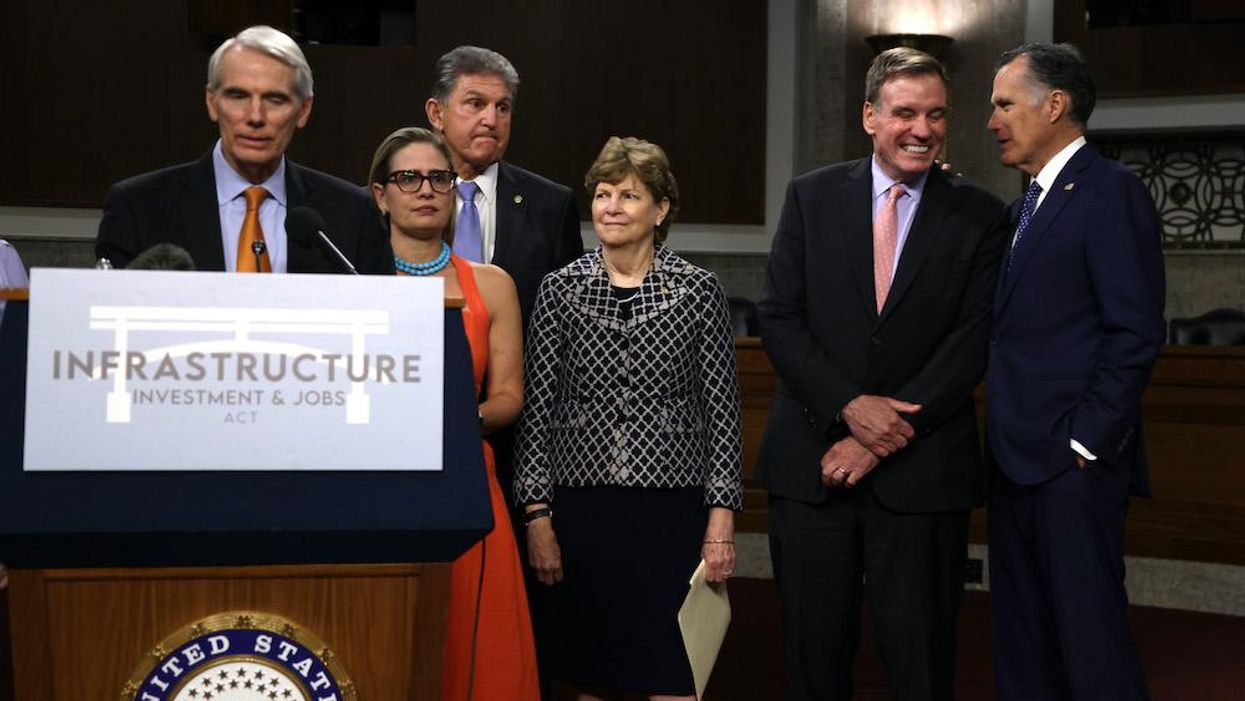
Photo by Alex Wong/Getty Images

The $1 trillion infrastructure bill currently working its way through the U.S. Senate hit a bump in the road Thursday when the Congressional Budget Office released its score of the bill, which estimated that the measure would add hundreds of billions of dollars to the federal budget deficit over the next 10 years, the Wall Street Journal reported.
The CBO analysis runs counter to claims made by the bipartisan group of senators who negotiated the bill that their plan is fully paid for.
And now senators plan to hurry to get the spending package passed this weekend.
Initially, the Democratic majorities in both houses of Congress were pushing a massive $3.5 trillion so-called infrastructure plan that is actually a progressive agenda catchall bill. The measure would fund what the left has called "human infrastructure" projects, such as Medicare expansion, national paid family leave, free college tuition, child tax credit extension, and Green New Deal climate change policies.
But the price tag was too much for Senate Republicans and at least one Democratic senator — Krysten Sinema of Arizona — meaning that in the 50-50 upper chamber, the bill was going nowhere.
So a bipartisan group of lawmakers negotiated an approximately $1 trillion spending package to cover issues such as transit, broadband, and water systems.
When they released their bill, the senators claimed it was fully paid for using "new revenue and savings," including repurposing COVID-19 aid and delaying a Trump-era Medicare rebate rule, as well as the usual series of accounting gimmicks, the Journal said.
But the CBO's score of the bill revealed that the measure would actually add $256 billion to federal budget deficit over the next decade.
The bipartisan group of negotiators claimed they expected the bad news from the CBO and still urged fellow senators to support the package.
“The new spending under the bill is offset through a combination of new revenue and savings, some of which is reflected in the formal CBO score and some of which is reflected in other savings and additional revenue identified in estimates, as CBO is limited in what it can include in its formal score," Sens. Sinema and Rob Portman (R-Ohio), two of the lead negotiators, said in a statement Thursday.
But some Republicans, who already had issues with the bill, indicated that the CBO score would impact whether they would ultimately vote for the bill.
Senate Republican Whip John Thune (S.D.) said, before the CBO announcement, "There's still a lot of swirl around the question of the pay-fors, and I think people are going to be drilling down, looking carefully at how real these are, and the official CBO scorecard, when it comes out, will be pretty determinative for a lot of people."
Florida Sen. Marco Rubio is one of those people. He took to Twitter following the CBO report to say, "The massive infrastructure bill is NOT, as its authors claim, 'fully paid for.'"
Montana Sen. Steve Daines agreed with his fellow Republican, saying, "This is absolutely unacceptable, especially at a time when Montana families are already dealing with soaring inflation and skyrocketing prices on everything from gas to groceries," the New York Times reported.
Florida's other Republican senator, Rick Scott, said that, though he supports spending on infrastructure, "we cannot afford this reckless spending," the Times said.
Now the bill's backers plan to "rush to pass" the measure this weekend, a Times headline blared. From the paper:
Republicans and Democrats rushed on Thursday to line up a Senate vote to pass the $1 trillion bipartisan infrastructure bill, working to clear away the final obstacles despite a finding by Congress's official scorekeeper that the bill would add more than $250 billion to the federal deficit over the next decade.
The CBO also said Thursday in a report unconnected to the infrastructure bill that the federal budget deficit would be about $3 trillion this year and average $1.2 trillion annually for the next 10 years, the Times reported.